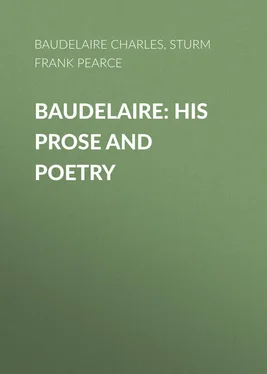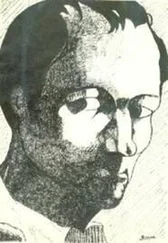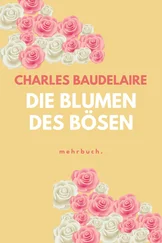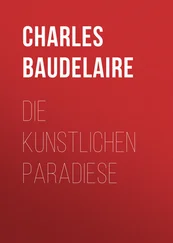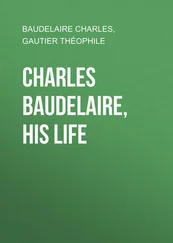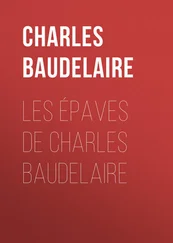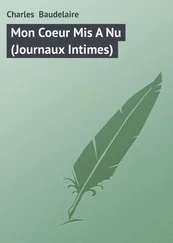Charles Baudelaire - Baudelaire - His Prose and Poetry
Здесь есть возможность читать онлайн «Charles Baudelaire - Baudelaire - His Prose and Poetry» — ознакомительный отрывок электронной книги совершенно бесплатно, а после прочтения отрывка купить полную версию. В некоторых случаях можно слушать аудио, скачать через торрент в формате fb2 и присутствует краткое содержание. Жанр: foreign_antique, foreign_prose, на английском языке. Описание произведения, (предисловие) а так же отзывы посетителей доступны на портале библиотеки ЛибКат.
- Название:Baudelaire: His Prose and Poetry
- Автор:
- Жанр:
- Год:неизвестен
- ISBN:нет данных
- Рейтинг книги:5 / 5. Голосов: 1
-
Избранное:Добавить в избранное
- Отзывы:
-
Ваша оценка:
- 100
- 1
- 2
- 3
- 4
- 5
Baudelaire: His Prose and Poetry: краткое содержание, описание и аннотация
Предлагаем к чтению аннотацию, описание, краткое содержание или предисловие (зависит от того, что написал сам автор книги «Baudelaire: His Prose and Poetry»). Если вы не нашли необходимую информацию о книге — напишите в комментариях, мы постараемся отыскать её.
Baudelaire: His Prose and Poetry — читать онлайн ознакомительный отрывок
Ниже представлен текст книги, разбитый по страницам. Система сохранения места последней прочитанной страницы, позволяет с удобством читать онлайн бесплатно книгу «Baudelaire: His Prose and Poetry», без необходимости каждый раз заново искать на чём Вы остановились. Поставьте закладку, и сможете в любой момент перейти на страницу, на которой закончили чтение.
Интервал:
Закладка:
Baudelaire was too deeply in love with the artificial to care overmuch for the symbols he could have found among natural objects. Only once in The Flowers of Evil does he look upon the Moon with the eyes of a mystic; and that is when he remembers that all people of imagination are under the Moon's influence, and makes his poet hide her iridescent tear in his heart, "far from the eyes of the Sun," for the Sun is lord of material labours and therefore hostile to the dreams and reveries that are the activity of the poet. He sought more for bizarre analogies and striking metaphors than for true symbols or correspondences. He is happiest when comparing the vault of the heaven to "the lighted ceiling of a music hall," or "the black lid of the mighty pot where the human generations boil"; and when he thinks of the unfortunate and unhappy folk of the world, he does not see any hope for them in any future state; he sees, simply, "God's awful claw" stretched out to tear them. He offers pity, but no comfort.
Sometimes he has a vision of a beauty unmingled with any malevolence; but it is always evoked by sensuous and material things; perfume or music; and always it is a sorrowful loveliness he mourns or praises. Perhaps of all his poems "The Balcony" is most full of that tender and reverential melancholy we look for in a poem of love; but even it tells of a passion that has faded out of heart and mind and become beautiful only with its passing away, and not of an existing love. The other love poems – if indeed such a name can be given to "A Madrigal of Sorrow," "The Eyes of Beauty," "The Remorse of the Dead," and the like – are nothing but terrible confessions of satiety, or cruelty, or terror. I have translated "The Corpse," his most famous and most infamous poem, partly because it shows him at his worst as the others in the volume at his best, partly because it is something of the nature of a literary curiosity. A poem like "The Corpse," which is simply an example of what may happen if any writer pushes his theories to the extreme, does not at all detract, be it said, from Baudelaire's delicate genius; for though he may not be quite worthy of a place by Dante, he has written poems that Dante might have been proud to write, and he is worthy to be set among the very greatest of the moderns, alongside Hugo and Verlaine. Read the sonnet entitled "Beauty" and you will see how he has invoked in fourteen lines the image of a goddess, mysterious and immortal; as fair as that Aphrodite who cast the shadow of her loveliness upon the Golden Age; as terrible as Pallas, "the warrior maid invincible." And as Minerva loved mortality in the person of Ulysses, so Baudelaire's personification of Beauty loves the poets who pray before her and gaze into her eternal eyes, watching the rising and setting of their visionary Star in those placid mirrors.
The explanation of most of Baudelaire's morbid imaginings is this, that he was a man haunted by terrible dream-like memories; chief among them the memory that the loveliness he had adored in woman – the curve of a perfect cheek, the lifting of a perfect arm in some gesture of imperial indolence, the fall of a curl across, a pale brow, all the minute and unforgettable things that give immortality to some movement of existence – all these, and the woman and her lover, must pass away from Time and Space; and he, unhappily, knew nothing of the philosophy that teaches us how all objects and events, even the most trivial – a woman's gesture, a rose, a sigh, a fading flame, the sound that trembles on a lute-string – find a place in Eternity when they pass from the recognition of our senses. If he believed in the deathlessness of man's personality he gained no comfort from his belief. He mourned the body's decay; he was not concerned with the soul; and no heaven less palpable than Mohammed's could have had any reality in his imagination.
His prose is as distinguished in its manner as his verse. I think it was Professor Saintsbury who first brought The Little Poems in Prose , a selection from which is included in this volume, before the notice of English readers in an essay written many years ago. I am writing this in France, far from the possibility of consulting any English books, but if my memory serves me rightly he considered the prose of these prose poems to be as perfect as literature can be. I think he said, "they go as far as prose can go." They need no other introduction than themselves, for they are perfect of their kind, and not different in thought from the more elaborately wrought poems of The Flowers of Evil . Some of them, as for instance "Every Man His Chimæra," are as classical and as universally true as the myths and symbolisms of the Old Testament; and all of them, I think, are worthy of a place in that book the Archangel of the Presence will consult when all is weighed in the balance – the book written by man himself, the record of his deep and shallow imaginings. Baudelaire wrote them, he said, because he had dreamed, "in his days of ambition," "of a miracle of poetical prose, musical without rhythm and without rhyme." His attitude of mind was always so natural to him that he never thought it necessary to make any excuse for the spirit of his art or the drear philosophy he preached; unless a short notice printed in the first edition of his poems, but withdrawn from the second edition, explaining that "faithful to his dolorous programme, the author of The Flowers of Evil , as a perfect comedian, has had to mould his spirit to all sophisms as to all corruptions," can be considered as an excuse. From whatever point of view we regard him: whether we praise his art and blame his philosophy, or blame his art and praise his philosophy, he is as difficult to analyse as he is difficult to give a place to, for we have none with whom to compare him, or very few, too few to be of service to the critic. His art is like the pearl, a beautiful product of disease, and to blame it is like blaming the pearl.
He looked upon life very much as Poe, whom he so admired, looked upon it: with the eye of a sensitive spectator in some gloomy vault of the Spanish Inquisition, where beauty was upon the rack; he was horrified, but unable to turn from a sight that fascinated him by its very terror. His moments of inspiration are haunted by the consciousness that evil beings, clothed with horror as with a shroud, are ever lingering about the temple of life and awaiting an opportunity to enter. He was like a man who awakens trembling from a nightmare, afraid of the darkness, and unable to believe the dawn may be less hopeless than the midnight. Perhaps he was haunted, as many artists and all mystics, by a fear of madness and of the unseen world of evil shapes that sanity hides from us and madness reveals. Is there a man, is there a writer, especially, who has not at times been conscious of a vague and terrible fear that the whole world of visible nature is but a comfortable illusion that may fade away in a moment and leave him face to face with the horror that has visited him in dreams? The old occult writers held that the evil thoughts of others beget phantoms in the air that can make themselves, bodies out of our fear, and haunt even our waking moments. These were the shapes of terror that haunted Baudelaire. Shelley, too, writes of them with as profound a knowledge as the magical writer of the Middle Ages. They come to haunt his Prometheus.
"Blackening the birth of day with countless wings,
And hollow underneath, like death."
They are the elemental beings who dwell beside the soul of the dreamer and the poet, "like a vain loud multitude"; turning life into death and all beautiful thoughts into poems like The Flowers of Evil , or into tales like the satanic reveries of Edgar Poe.
"We are the ministers of pain, and fear,
And disappointment, and mistrust, and hate,
And clinging crime; and as lean dogs pursue
Through wood and lake some struck and sobbing fawn,
We track all things that weep, and bleed, and live,
When the great King betrays them to our will."
Интервал:
Закладка:
Похожие книги на «Baudelaire: His Prose and Poetry»
Представляем Вашему вниманию похожие книги на «Baudelaire: His Prose and Poetry» списком для выбора. Мы отобрали схожую по названию и смыслу литературу в надежде предоставить читателям больше вариантов отыскать новые, интересные, ещё непрочитанные произведения.
Обсуждение, отзывы о книге «Baudelaire: His Prose and Poetry» и просто собственные мнения читателей. Оставьте ваши комментарии, напишите, что Вы думаете о произведении, его смысле или главных героях. Укажите что конкретно понравилось, а что нет, и почему Вы так считаете.
